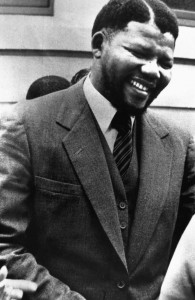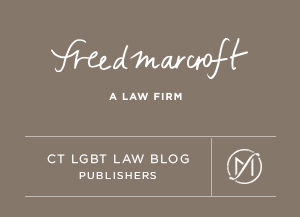Nelson Mandela and Gay Rights: “The True Test of our Devotion to Freedom is Just Beginning.”
 Today, the world mourns the loss of Nelson Mandela.
Today, the world mourns the loss of Nelson Mandela.
My law school Sexual Orientation and the Law professor devoted time to the post-apartheid South African constitution — a document that has been heralded as the new international model and which would not exist but for Nelson Mandela’s leadership. The South African constitution includes the freedom from discrimination — including on the basis of sexual orientation. This provision, written in 1994, was still stunning to my American law student self when I studied it a full 10 years after it was drafted.
John Matisonn, NPR’s southern Africa correspondent from 1986 to 1991, remembers that “Mandela supported gay rights and gay marriage from 1994 when he became president. And that’s a couple of decades before any other head of government or head of state in the Western world. So he was really ahead of his time and continued to be.”
After apartheid ended, President Nelson Mandela’s government “pushed to end all forms of discrimination,” including “the rights of gay and lesbian soldiers.” As mentioned above, the 1994 post-apartheid constitution made South Africa one of the first countries in the world to outlaw discrimination on the basis of sexual orientation.
Also in 1994, President Mandela also appointed Edwin Cameron, an out, HIV-positive judge to the South African bench. Edwin told The Guardian in 2010 that Mandela’s release from prison was “epochal,” and that:
I’ve been a beneficiary. Mandela appointed me at the end of his first year in office in December 1994 as an openly and proudly gay man to the high court and, 16 years later, I’m a member of South Africa’s highest court. I can truly say my sexual orientation was irrelevant.
Laws criminalizing sex between men, which remained on the statute books despite the post-apartheid constitution, were outlawed in 1998 by South Africa’s highest court, the Constitutional Court. Also in 1998, a female officer’s lesbian partner was covered by her medical insurance.
Subsequently, South Africa became the first country in Africa to legalize marriage rights for same sex couples when in 2005, the Constitutional Court ruled in Minister of Home Affairs v. Fourie that denying same sex couples the right to marry was unconstitutional.
Banning same-sex marriages represented a harsh if oblique statement by the law that same-sex couples are outsiders, and that their need for affirmation and protection of their intimate relations as human beings is somehow less than that of heterosexual couples.
According to South African Justice Albie Sachs, who authored the Court’s decision, after “months of discussion,” the justices ruled unanimously that the common law definition of marriage and section 35(1) of the Marriage Act of 1961 constituted unfair discrimination against same-sex couples. Owen Lubozynski, the author of an article about Sachs’ lecture on the landmark decision at Cornell Law School, writes:
The most difficult task in writing the decision, Sachs recalled, was recognizing the deep religious beliefs held by the majority of the country’s citizens, which made it imperative to present the ruling not as a victory for any particular position but as a victory for a constitutional vision encompassing different, co-existing belief systems.
The Court gave the South African Parliament one year to correct the defect in the law. In 2006, the Civil Union Act was enacted, and on November 30, 2006, Robben Island, where Nelson Mandela was imprisoned, became one of the first places to host a civil union ceremony.
One of Nelson’s most cherished statements about human rights comes from his autobiography:
A man who takes away another man’s freedom is a prisoner of hatred, he is locked behind the bars of prejudice and narrow-mindedness. I am not truly free if I am taking away someone else’s freedom, just as surely as I am not free when my freedom is taken from me. The oppressed and the oppressor alike are robbed of their humanity.
When I walked out of prison, that was my mission, to liberate the oppressed and the oppressor both. Some say that has now been achieved. But I know that that is not the case. The truth is that we are not yet free; we have merely achieved the freedom to be free, the right not to be oppressed. We have not taken the final step of our journey, but the first step on a longer and even more difficult road. For to be free is not merely to cast off one’s chains, but to live in a way that respects and enhances the freedom of others. The true test of our devotion to freedom is just beginning.

